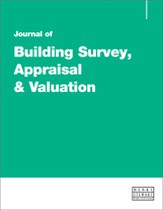Developing brownfield land: Arguments for a more active local state
Abstract
This paper summarises the approach taken by English policy makers in the last 20 years towards brownfield development, which they consider desirable but largely to be delivered by the market, rather than the state. Recent policy developments are outlined, with a clear trend towards liberalisation of the planning system. The paper contends that this misses an opportunity: brownfield development in England often relies on local authorities playing an active role, and there is compelling evidence from continental Europe, notably Germany and Holland, that powers for an active local state are important in realising its potential.
The full article is available to subscribers to the journal.
Author's Biography
Ed Turner is Senior Lecturer in Politics and International Relations at Aston University and Deputy Leader of Oxford City Council. He was a member of the Lyons Review of Housing, and currently holds a grant from the German Academic Exchange Service (DAAD) to compare housing policy in England and Germany.
Citation
Turner, Ed (2016, November 1). Developing brownfield land: Arguments for a more active local state. In the Journal of Building Survey, Appraisal & Valuation, Volume 5, Issue 3. https://doi.org/10.69554/HIPW7686.Publications LLP
